
Addiction is a communal disease. This means that it affects not just the individual, but families, friends, and the workplace. Find out why drug addiction is more than a solo journey.
Addiction Affects More Than Just the Individual
Recently the nation has become enormously aware of a persistent problem. Drug addiction has been called an epidemic. The opioid epidemic, to be specific, however, drug addiction is a problem at large. Odds are, no matter who you are, you have been affected by a drug addiction. Maybe you have a family member struggling with a drug addiction, maybe you know someone who is undergoing treatment, or maybe you are struggling with an addiction and do not know what to do. FHE Health wants to help all of these cases, however, take notice of something. That is, the universality of addiction. This is an extremely large problem that never affects the self. We will be discussing ways addiction affects people in the following ways.
- The family
- Marriage
- Children
- The workplace
- Friends
Let’s take a deeper look at how addiction affects these different groups.
How Addiction Affects the Family
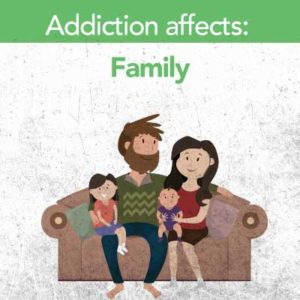 Many are now not only calling addiction a disease, but it is being referred to as a family disease. This is because it affects the family just as much as the individual. The specific members of the family will be addressed later, however, it is important to note that addiction changes the structure of the family. If a parent struggles with an addiction, then there is something shifted in the authority structure for the children. Members of the family struggling with addiction can traumatize their family members or children. More than this, the family will not know how to react. Thus, they may cause unhealthy coping mechanisms, which can be enabling the individual with the disease, or even disciplining them too much. Either way, the whole family should seek recovery. Participating in recovery as a family has been shown to be extremely beneficial for the addict. In fact, drug addiction rehab is more likely to be successful, if the whole family contributes. It causes accountability, open communication, and understanding.
Many are now not only calling addiction a disease, but it is being referred to as a family disease. This is because it affects the family just as much as the individual. The specific members of the family will be addressed later, however, it is important to note that addiction changes the structure of the family. If a parent struggles with an addiction, then there is something shifted in the authority structure for the children. Members of the family struggling with addiction can traumatize their family members or children. More than this, the family will not know how to react. Thus, they may cause unhealthy coping mechanisms, which can be enabling the individual with the disease, or even disciplining them too much. Either way, the whole family should seek recovery. Participating in recovery as a family has been shown to be extremely beneficial for the addict. In fact, drug addiction rehab is more likely to be successful, if the whole family contributes. It causes accountability, open communication, and understanding.
On a more scientific level, addiction does appear to have some hereditary significance. If your parents or grandparents have struggled with addiction, then you are much more likely to struggle with addiction as well. Some people are predisposed to be more likely to get addicted to something easier than others. Some call this an addictive personality. While some people who have witnessed addiction in their family member will see its destructive nature and avoid it completely, others simply don’t have the willpower. It is important to consider these facts when evaluating your own addictive habits or the habits of a loved one.
How Addiction Affects a Marriage
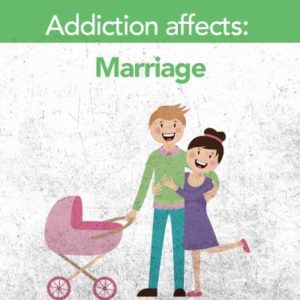 Did you know that drug addiction is the third most common cause of divorce for women and the eighth for men? This is staggering, especially when we acknowledge that much addiction occurs in the confines of a relationship. This does not mean the individual will automatically be aggressive and abusive. The false idea that addiction or alcoholism causes battering, is misguided. Battering itself is something that is learned through circumstances of life, and not innate to the human condition. It is more likely to develop an addiction if the desire to batter has been forged. That being said, addiction centers our whole lives and changes us. Whether we used to be productive, but are now lazy, shifting our humor, or the things that we regularly do, all these things affect a marriage. Marriage is already hard on its own, without a completely different person who is now struggling with a drug addiction.
Did you know that drug addiction is the third most common cause of divorce for women and the eighth for men? This is staggering, especially when we acknowledge that much addiction occurs in the confines of a relationship. This does not mean the individual will automatically be aggressive and abusive. The false idea that addiction or alcoholism causes battering, is misguided. Battering itself is something that is learned through circumstances of life, and not innate to the human condition. It is more likely to develop an addiction if the desire to batter has been forged. That being said, addiction centers our whole lives and changes us. Whether we used to be productive, but are now lazy, shifting our humor, or the things that we regularly do, all these things affect a marriage. Marriage is already hard on its own, without a completely different person who is now struggling with a drug addiction.
If you discover your partner is struggling with addiction, or you have been witnessing it for a long time, it can be very straining on a relationship. While some people will end a relationship right away, it is important to try and get your loved one help instead of walking away. More often than not, your spouse needs your support and love in order to get sober. Thousands of people every month get clean and sober and end up living happy lives without drugs and alcohol. Their success rate goes up considerably with the support of a loved one, especially a spouse.
That being said, if your partner is in active addiction, and is abusing you or taking advantage of you, it is important to separate yourself immediately. It is vital to save yourself from a dangerous environment, even if it can be very difficult to leave a spouse. They may need to see how serious you are about their sobriety before they make a decision to get help. If they know that you will leave them without a change in their behavior, it can be the final straw to make a life change.
How Addiction Affects Children
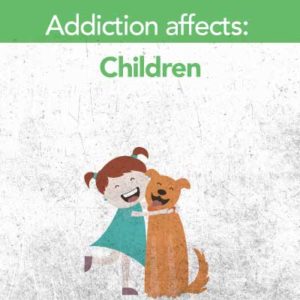 Children need an upbringing filled with structure. Thus, when a parent experiences a drug addiction, it shifts that structure. Suddenly, it is not uncommon for parents to be completely different people, have no authority over their children, or even ask children for money. These things can throw the structure of the children’s life out the window. It can affect how they behave, maybe lashing out at other classmates. It can affect how they crave attention since their parent only gave attention to their drug addiction, the child may crave it, and seek it in places that are not healthy. Or, the worst case scenario, is that drug addictions are much more likely to be experienced by children of drug-addicted parents. This leads some to think that the disease of addiction is hereditary. Either way, it is very clear that addiction affects the children just as much as many other members of the family. Thus, you owe it to them to get treated. We at FHE Health have numerous facilities ready for you to get help at.
Children need an upbringing filled with structure. Thus, when a parent experiences a drug addiction, it shifts that structure. Suddenly, it is not uncommon for parents to be completely different people, have no authority over their children, or even ask children for money. These things can throw the structure of the children’s life out the window. It can affect how they behave, maybe lashing out at other classmates. It can affect how they crave attention since their parent only gave attention to their drug addiction, the child may crave it, and seek it in places that are not healthy. Or, the worst case scenario, is that drug addictions are much more likely to be experienced by children of drug-addicted parents. This leads some to think that the disease of addiction is hereditary. Either way, it is very clear that addiction affects the children just as much as many other members of the family. Thus, you owe it to them to get treated. We at FHE Health have numerous facilities ready for you to get help at.
Many children develop mental or behavioral issues after living with an addict for an extended period of time. If you know a child who may be in a situation where they are living with an addict, it is important to intervene as soon as possible. Most children do not know how to react and may feel too embarrassed to seek out help for their parent or loved one. They are in a very hard situation and the shame will often keep them from seeking the help of another adult. You can be the one to intervene and offer them the help they need.
How Addiction Affects the Workplace
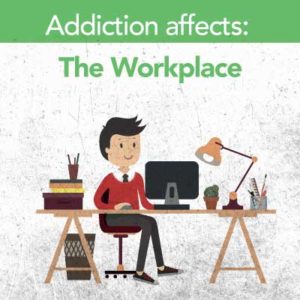 Did you know that many individuals struggling with a drug addiction still have their jobs? However, since addiction is constantly changing us, centering our lives and thoughts around the drug, there is no way to be as productive as you thought you were when you did not struggle with a drug addiction. Working on large projects, taking initiative at work or even maintaining a job are all difficult. Every year billions of dollars are lost due to a lack of productivity caused by drug addiction. This affects our co-workers, who are an increasingly large part of our lives (despite what we would like to admit), it affects our payments, which in turn affect our family, and it affects us. The workplace might seem like a trivial part of our lives to worry about, but it is where we make our livelihood and spend most of our time.
Did you know that many individuals struggling with a drug addiction still have their jobs? However, since addiction is constantly changing us, centering our lives and thoughts around the drug, there is no way to be as productive as you thought you were when you did not struggle with a drug addiction. Working on large projects, taking initiative at work or even maintaining a job are all difficult. Every year billions of dollars are lost due to a lack of productivity caused by drug addiction. This affects our co-workers, who are an increasingly large part of our lives (despite what we would like to admit), it affects our payments, which in turn affect our family, and it affects us. The workplace might seem like a trivial part of our lives to worry about, but it is where we make our livelihood and spend most of our time.
Additionally, you are sacrificing the progress of your career. Aside from the resentment of your coworkers and disappointment of your boss, you are hurting your own career more than anything. You may end up burning bridges that would have helped you progress to a better or higher paying job. Getting fired because of an addiction will make it harder to find a new job as you cannot use that workplace as a resource or recommendation.
That being said, employers are not legally allowed to fire you for an addiction problem if you are willing to seek treatment. If you come clean to your employer about your issue and willing to get help, they are often times required by law to give you the necessary time off to get help. Addiction is seen as a medical condition can you are allowed to leave your job temporarily to attend treatment programs.
How Addiction Affects Friends
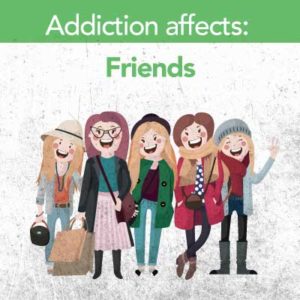 Friends too are affected by a drug addiction. The people you have known for years may no longer feel like they know you. The friendships that have lasted through high-school, college, and so on might be at risk of stopping. Friendships and relationships are extremely important to our well-being and contribution to society. Thus, when we become a completely different person, this throws the whole thing out of balance. We owe it to our friends, who will often have to take care of us, to get the treatment we need. Addiction in nature is a very selfish disease. When in active addiction we will do almost anything to get the drugs or alcohol we need to keep dope sickness away. While an addict’s whole focus is on drugs, they begin to hurt friends in ways they never would have imagined. Whether it be lying, borrowing money, stealing money, or just taking advantage of the friendship without even realizing they are hurting those around them. Addicts are blinded by the need for more drugs and won’t realize the damage they are doing to those around them. Below, we will be discussing how to get treatment.
Friends too are affected by a drug addiction. The people you have known for years may no longer feel like they know you. The friendships that have lasted through high-school, college, and so on might be at risk of stopping. Friendships and relationships are extremely important to our well-being and contribution to society. Thus, when we become a completely different person, this throws the whole thing out of balance. We owe it to our friends, who will often have to take care of us, to get the treatment we need. Addiction in nature is a very selfish disease. When in active addiction we will do almost anything to get the drugs or alcohol we need to keep dope sickness away. While an addict’s whole focus is on drugs, they begin to hurt friends in ways they never would have imagined. Whether it be lying, borrowing money, stealing money, or just taking advantage of the friendship without even realizing they are hurting those around them. Addicts are blinded by the need for more drugs and won’t realize the damage they are doing to those around them. Below, we will be discussing how to get treatment.
How to Get Treatment for Addiction
We at FHE Health want to go on this journey with you. We believe you cannot separate mental health from drug addiction, which is why we care for both. We offer numerous treatment options and are always looking to give you the help and focus you need. We offer a 24/7 call number, (833) 596-3502. Along with this, we have a contact page that allows you to reach out to us through the web. These will connect you with someone who can answer your questions, disprove any myths, or simply talk about your difficult journey. Do not hesitate, get help today.






